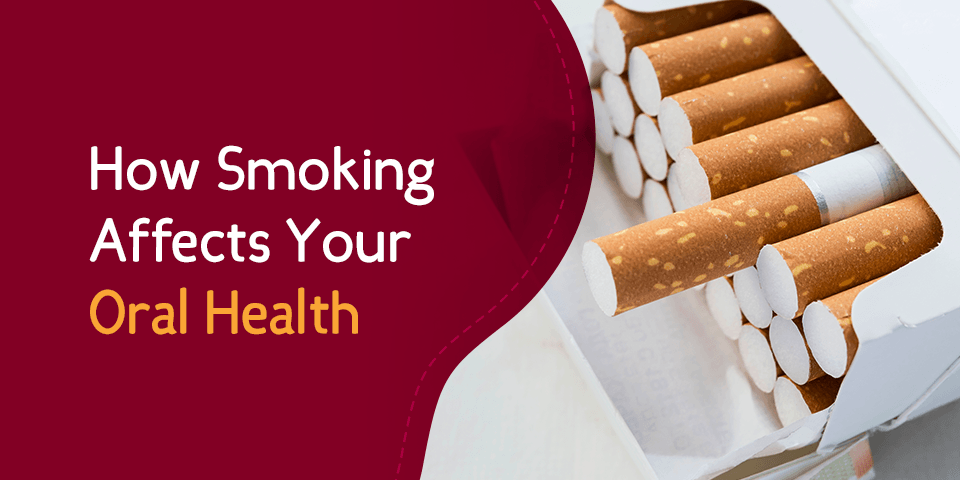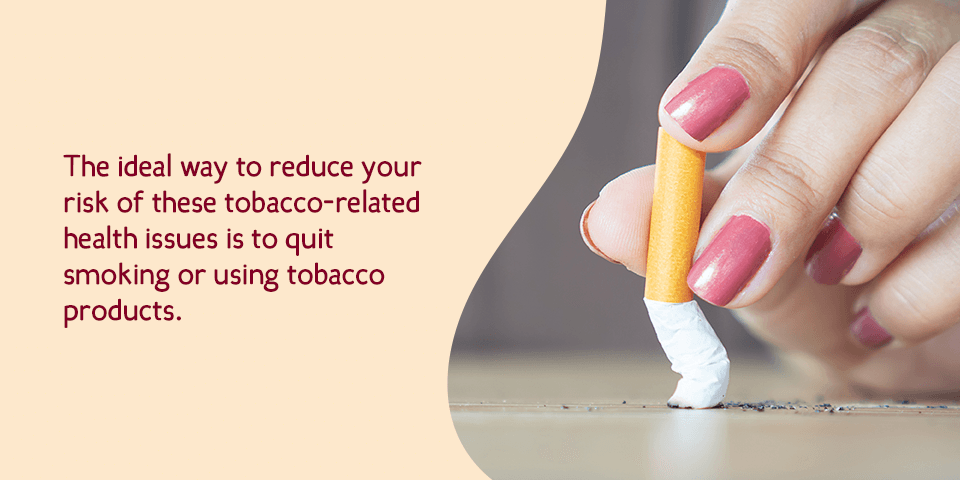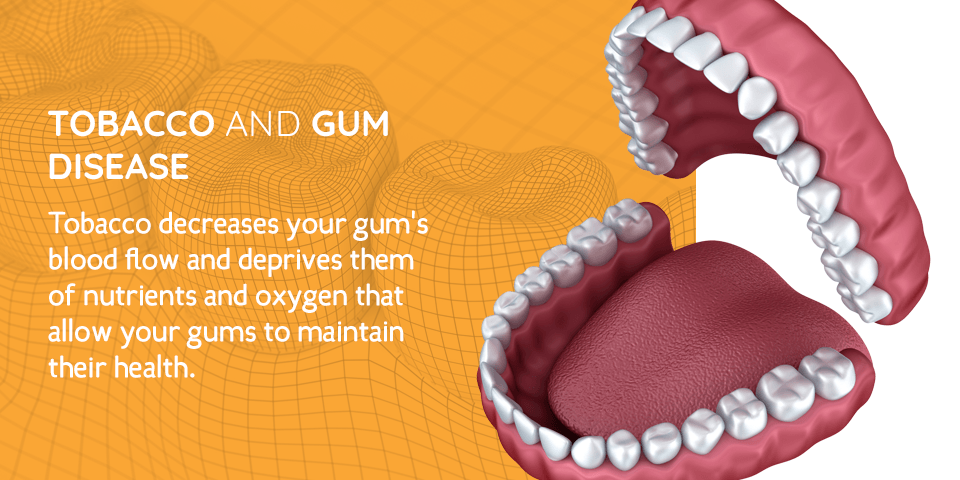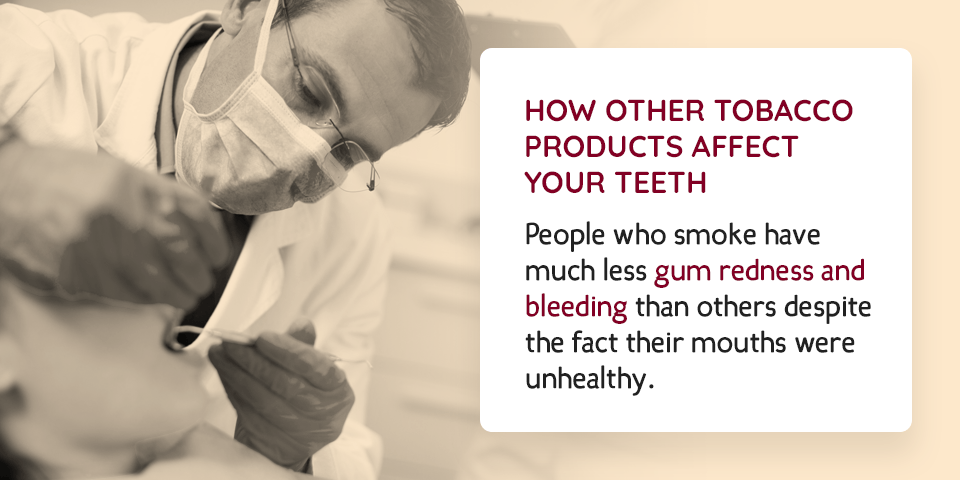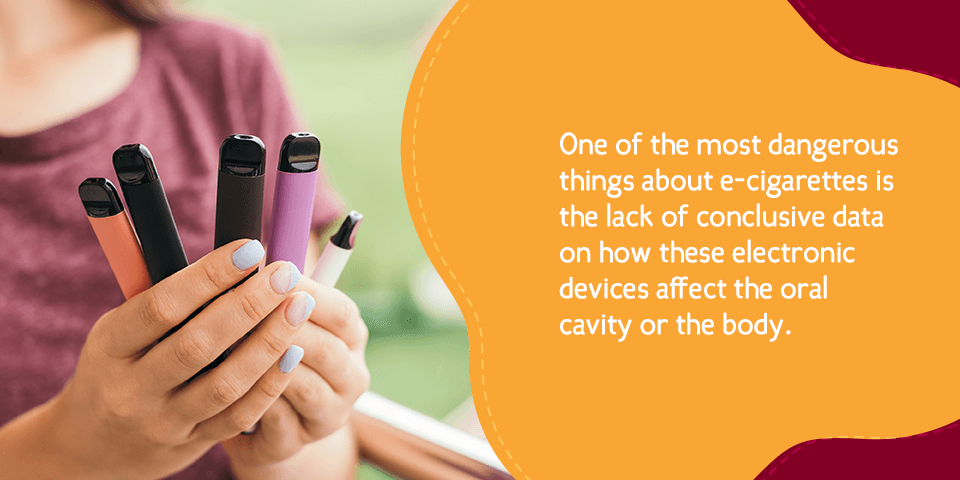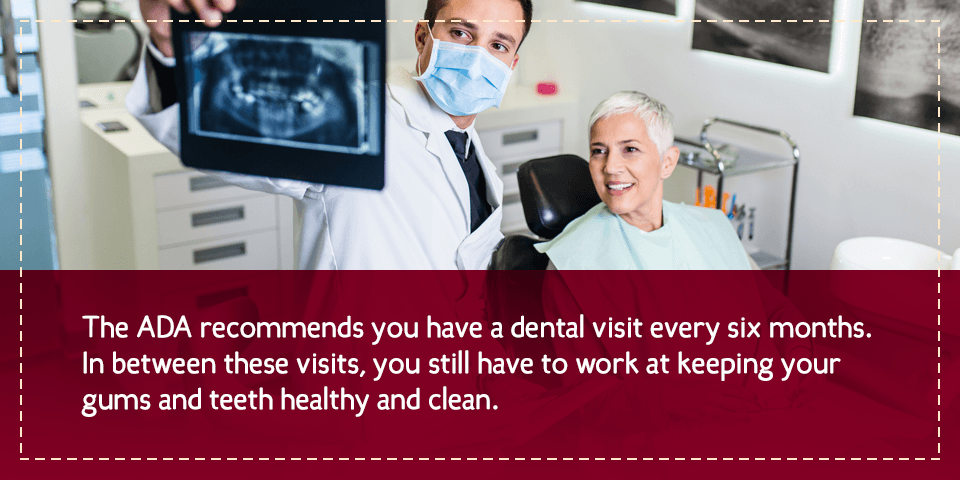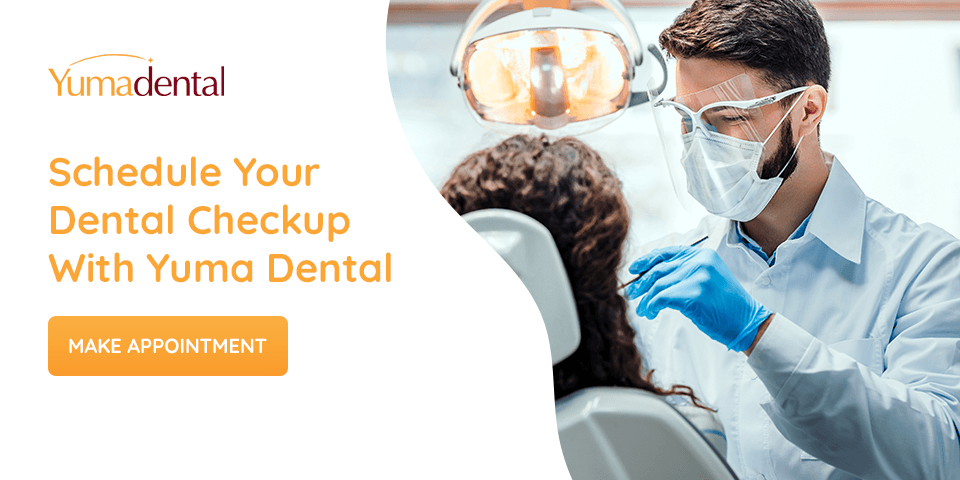While it doesn’t always make the news reports as much as other areas of the body, how smoking affects your teeth is something you need to consider if you smoke. Most everyone realizes smoking harms your health, particularly regarding heart and lung diseases, but many probably don’t know the habit can be a significant contributor to dental problems as well.
Here at Yuma Dental in Yuma, Arizona, we want you to know how smoking affects your oral health. A healthy smile is essential for most people. It’s usually the first thing a person notices when they meet someone for the first time. No one wants a discolored or stained smile or bad breath. Smoking is a leading culprit for these things. But the detrimental effects of smoking on oral health go beyond having discolored teeth and bad breath.
Routine brushing is only one part of removing stains and reducing bad breath. The rest involves quitting smoking and visiting your Yuma dentist regularly for a dental examination.
Table of Contents
Effects Of Smoking On Teeth
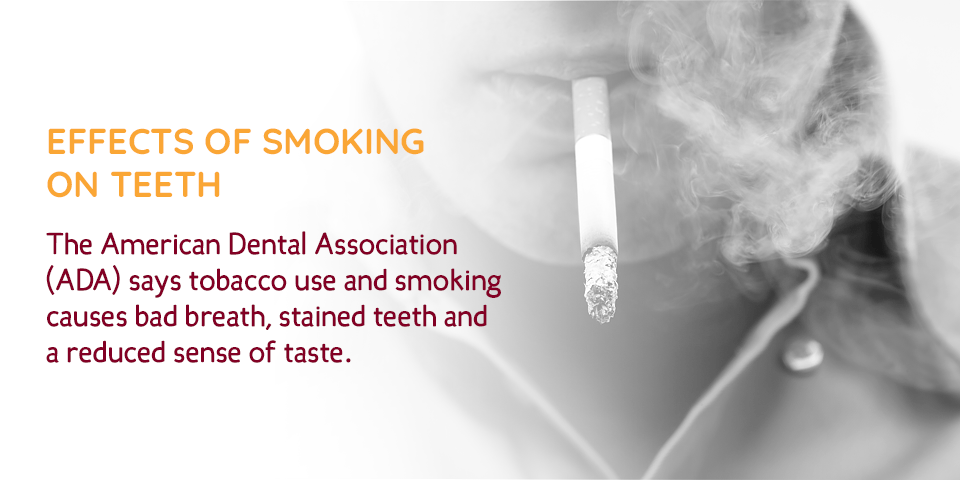
Potential oral health effects of smokeless tobacco products and smoking include the following.
- Stained teeth and tongue: Smokers’ teeth can be less attractive because of the steady and increased buildup of tartar and plaque. Smoking can stain your teeth, and in some individuals, the “black hairy tongue” condition develops due to a buildup of dead cells on the taste buds because of tobacco use.
- Bad breath: The tar and nicotine from tobacco get deposited in your mouth. These chemicals can stick to your tongue, sides of your cheeks, gums and teeth, resulting in smoker’s breath.
- Dulled sense of smell and taste: Smoking throws off your taste and keeps you from recognizing odors. When you quit, your sense of smell and taste will come back.
- Cosmetic corrections: You can experience difficulties in correcting cosmetic dental problems.
The above effects are some of the less severe occurrences that can result from smoking. However, smoking also causes worsening health issues, including the following.
- Quicker wearing down of teeth: Cigars and chewing tobacco can contain unprocessed tobacco leaves with tiny, abrasive particles. Chewing tobacco mixes with saliva, creating a rough paste that wears your teeth down over time.
- Increased risk of tooth decay: This issue can also make the need for restorative dentistry more likely.
- Gum disease: Smoking is also a significant risk factor linked with gum or periodontal disease. Gum disease causes inflammation around teeth, which affects the bone and other supporting structures. In its advanced stages, it can lead to tooth loss.
- Slow healing after surgery: Tobacco impacts postoperative wound healing after a nonsurgical and surgical tooth extraction, implants, routine maxillofacial surgery and periodontal therapy.
- Oral cancer: Using tobacco, particularly smokeless tobacco products, increases your oral cancer risk, which could be aggressive because of the number of lymph nodes and blood vessels in your neck and head.
- Fewer dental treatment options: Mouth damage due to smoking includes increased bacteria, reduced blood flow and inflammation. Problems like these can make it harder to replace lost teeth. For instance, bridges and implants may not be an option for dental treatment because your jawbone and surrounding teeth might have weakened from decay or infection and aren’t strong enough to support procedures like these.
- Increased difficulty to treat gum disease: Smoking affects your immune system and its ability to do its job, as mentioned. Therefore, if you’re a smoker, it may be more challenging to fight dental problems linked to gum disease.
The ideal way to reduce your risk of these tobacco-related health issues is to quit smoking or using tobacco products.
Tobacco and Gum Disease
Smoking is a substantial risk factor for gum disease. Tobacco decreases your gums’ blood flow and deprives them of nutrients and oxygen that allow your gums to maintain their health.
Smoking impacts the attachment of soft tissue and bone to your teeth. In particular, it seems smoking interferes with the regular function of your gum tissue cells, making smokers more vulnerable to infections like gum disease.
It also leaves your gums susceptible to bacterial infection. And, smoking can cause your mouth to harbor more aggressive bacteria types.
If left untreated, gum disease can cause issues like these.
1. Calculus Formation
Smokers have higher chances than nonsmokers of forming calculus on their teeth, having deeper pockets between their gums and teeth and losing more tissue and bone supporting the teeth.
If you have calculus and your dentist doesn’t remove it with a professional dental cleaning, it stays below your gumline. Then, the bacteria in the calculus can damage your gum tissue, causing your gums to start pulling away from your teeth and forming pockets that fill up with germs. This condition is periodontal disease, which will progress if left untreated. The pockets between your gums and teeth can grow deeper and allow more bacteria in, destroying supporting bone and tissue.
2. Abscesses
Untreated tooth decay or gum disease can lead to you developing a tooth abscess. This phenomenon occurs when pus builds up inside your gums or teeth. Pus can form when your body is trying to fight an infection caused by bacteria. When the pus can’t drain, it forms an abscess. An abscessed tooth requires immediate treatment from a dental professional, as the infection might spread to other parts of the body.
3. Gum Destruction
Smokers have two times the risk of developing gum disease than those who don’t smoke to suffer from periodontal disease. Young smokers have more gum attachment and bone loss than their non-smoking counterparts.
4. Total Destruction of the Supporting Tissues of the Teeth
Often, people experience extremely mild symptoms with this destructive process. Gradually, their teeth become loose, and a dentist needs to extract them.
5. Tooth Loss
The tissue and bone holding your teeth in place can start breaking down, and your teeth can become loose, fall out or require extraction. Therefore, you’re at an increased risk of losing a tooth if you smoke.
How Tobacco Products Affect Your Teeth
Cigarettes aren’t the only method of tobacco use that contributes to gum disease. With the various types of tobacco, electronic and herbal smoke options available, you must realize any one of these products can still damage your gums and teeth. You may be wondering whether specific smoking methods are better or worse for you. You’ll have a tobacco and oral health risk with each product, which can impact your risk for oral diseases, like oral cancer and gum disease, deteriorating your smile over time.
All tobacco products can impact your gums’ health. Temple University researchers conducted a study revealing evidence of this risk. They found nearly 18% of former pipe or cigar smokers suffered from moderate to severe gum disease, equating to three times the amount seen in nonsmokers. Vaping’s effects on teeth can also cause health complications.
People who smoke have much less gum redness and bleeding than other tobacco users, despite having unhealthy mouths. The lack of these issues may give some people the false impression their gums are healthy. If you smoke, it’s essential to have regular dental checkups to evaluate your gum health.
1. Cigarettes and Cigars
In 1964, the U.S. Surgeon General issued America’s first public health warning regarding the dangers of cigarette smoke, including tooth loss. Cigarette smoking more than doubles your chances of developing gum disease, in addition to causing more tartar and plaque buildup on your teeth.
Cigarettes also contain nicotine, which is incredibly addictive. Nicotine reduces gum tissue blood flow, stopping essential nutrients from reaching from this critical supportive tissue to your teeth. Inhibited circulation can result in an increased risk for gum disease. Cigarettes also increase your oral cancer risk and may cause bad breath and a dry mouth.
You may think cigars are safer than smoking cigarettes because you’re not inhaling the smoke. However, cigar smoke still contains toxic substances and comes in contact with mouth tissues. One standard-sized cigar could have as much nicotine in it as a whole pack of cigarettes. Cigar smoke also increases your risk for other diseases, including heart and lung disease and oral cancer. Whether you’re a regular or occasional cigar smoker, they aren’t any better than cigarettes for your smile.
2. E-Cigarettes and Vapes
How do e-cigarettes and vaping impact oral health? Researchers believe they’re not as harmful as cigarettes, but they’re still toxic to your body and come with similar risks, including oral cancer. One of the most dangerous things about e-cigarettes is the lack of conclusive data on how these electronic devices affect the oral cavity or the body. The effects of vaping on teeth include the following risks.
- Gum recession: E-cigarettes still contain nicotine that dries your mouth out. As a result, your gum tissue doesn’t get the nutrients and oxygen it requires to stay healthy. Because of this, gum recession can occur along with a higher risk for gum disease, much like with regular cigarettes. Vapes containing THC also cause dry mouth.
- Gum disease: E-cigarettes can mask gum disease symptoms, making it more challenging to detect because of the swelling in the infected area and lack of blood flow.
- Bruxism: Nicotine releases dopamine that can stimulate muscles, which causes jaw muscles to contract. This phenomenon often occurs during sleep, and the muscle contractions cause teeth to grind against each other, which flattens chewing surfaces.
- Tooth sensitivity: Jaw grinding, gum irritation and recession can also cause tooth sensitivity because teeth grinding damages tooth enamel and increases cold and heat sensitivity.
- Infection: Nicotine reduces the oxygen that the body circulates and sends to vital tissues and organs. A lack of circulation increases the risk of infection in various body parts, including the mouth.
- Dry socket: Following dental surgeries such as tooth extractions, e-cigarettes and vapes carry the same risk for dry socket as traditional cigarettes and straws. Smoking can also cause blood clots to occur.
- Cavities: THC stimulates appetite, which can lead to the consumption of more sugary foods that leave plaque on the teeth.
3. Pipe Tobacco (Natural Tobacco)
Herbal cigarettes or natural tobacco can also be toxic to your oral cavity and body. They produce tar and carbon monoxide, increasing your risk for cancer.
Also, there’s no evidence showing pipe tobacco smoking is safer than regular cigarette smoking. You still expose your body to carcinogens when you burn and inhale tobacco. However, there is evidence that pipe tobacco smokers have more instances of cancer than individuals who smoke regular cigarettes.
4. Smokeless Tobacco
Smokeless tobacco may lead to your gums receding, increasing the chance of losing the fibers and bone holding your teeth in place. The labels on smokeless tobacco products have warnings that the products may cause gum disease, oral cancer or tooth loss. Other types of natural tobacco, like chewing tobacco, increase your risk for oral cancer even if you’re not inhaling smoke because you’re still exposing your oral cavity to nicotine and toxins.
Importance of Visiting Your Yuma, Arizona, Dentist
Regular dental visits to our Yuma, Arizona, office are vital for maintaining healthy gums and teeth. The ADA recommends you have a dental visit every six months. Between these visits, you still have to work at keeping your gums and teeth healthy and clean. Depending on your oral health, we may suggest more frequent visits.
One part of our thorough dental exam is checking your teeth for tooth decay. During your checkup visit, we’ll assess the health of your gums, examine your neck and head to check for anything abnormal and examine your mouth to check for signs of oral cancer.
We’ll pay particular attention to tartar and plaque since they tend to build up quickly if you don’t practice good oral hygiene between visits. If you don’t remove soft plaque, it can lead to the following issues.
- Build up: Plaque can harden on your teeth.
- Irritate your gum tissue: Plaque can produce toxins.
- Cause gum disease: Advanced periodontal disease can cause painful chewing problems, bleeding gums and even tooth loss.
We’re not only concerned with examining and fixing your teeth. We also aim to ensure your gums and teeth are healthy, professionally clean your teeth and check for abnormalities that could go unnoticed and result in advanced dental health problems. We’ll work with you to correct any oral health-sabotaging habits.
Skipping dental visits might not seem like a big deal. However, oral problems can develop and progress quickly whether you notice them or not. If you’re thinking about skipping a dental visit due to dental anxiety, time, cost or another factor, make sure you consider all the risks. You may end up paying down the road, with both your wallet and your health, for not keeping up with your dental appointments.
Schedule Your Dental Checkup With Yuma Dental
Is it time for you to come in and see us for a checkup? Are you searching for a new Yuma dentist? We’d love to have you become a patient here at Yuma Dental. All patients are welcome, including children. We pride ourselves in providing everyone with the best caring and friendly dental service possible.
Whether you’re looking for restorative, preventive or emergency care, we’re here for you. We even offer same-day appointments for emergencies and regular checkups. Give us a call to schedule your appointment at 928-344-5700 or make your appointment online.

